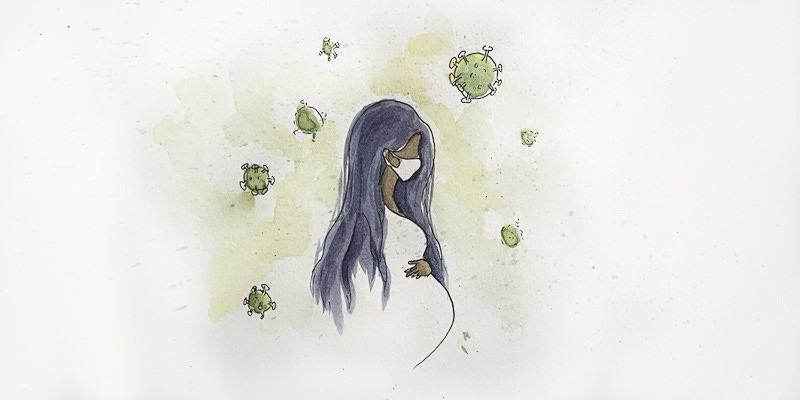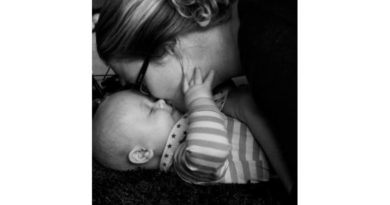Pandemic Pregnancy
In 2020, we collectively hit the pause button, thanks to an event which we will certainly look back on as being two things at once: entirely predictable and yet entirely unexpected. Still, life goes on. Life goes slowly, life gets hard; it hits us hard, too, but it does go on.
There are many things pregnancy is supposed to be: Pinterest-perfect baby showers, birth plans, a cute little nursery, an adorable little nesting phase… And there are many things that pregnancy actually is: Swollen ankles, aching back, myriad worries and niggles, and prenatal anxiety. The list goes on and indeed, it is endless, because each pregnancy is unique just as each giver of birth is unique.
When it comes to pregnancy, resilience is also par for the course. It is expected and it is what society demands. Reams of research have been devoted to studying how resilience is a protective factor in pregnancy or how women with a high level of resilience are less prone to stress than those with a lower level of resilience.
Resilience – the ability to cope effectively with adversity – appears to be a desirable characteristic. But is it possible to be resilient all the time, or at least for the duration of this seemingly interminable pandemic while also being pregnant? While pregnancy by no means makes one a victim, it is widely agreed that pregnancy can be a confusing time, even during the halcyon times where the sense of duality is heightened, when one can feel both grateful and stressed at the same time. It can be exhausting, emotionally draining, and rewarding. That is a tumult of emotions to process at once. And in a pandemic? What then?
After the initial smirk and murmur about “Coronials,” the tongue-in-cheek collective noun describing babies born during the pandemic, quieted down, op-eds about pandemic pregnancies began to pop up. Some suggested pregnant people be reassured by the events following the 1918 Flu Pandemic. Some reflected on personal experience, and others reflected with cautious optimism on the basis of medical knowledge available at the time.
Remember those banana bread and Dalgona days when we all hummed the theme tune from Money Heist and remained blissfully convinced that everything would right itself in October? Friends of mine who have experienced pregnancy or have given birth during the pandemic have mentioned that it was much easier to feel resilient when we all thought that the pandemic had an expiry date.
However, in lieu of an expiration date for the Coronavirus, what we have is a never ending series of shifting goalposts. In spite of the vaccines being rolled out, confusion, worry and stress about hospital restrictions seem to be an additional burden on the pregnant person’s pandemic journey.
I have a pregnant friend – let’s call her Alex. Last year, when things were beginning to look serious, ahead of the Swiss lockdown, Alex’s gynaecologist told her that it would be absolutely fine for her to carry on working full-time in her service-industry job. Unable to get a written note from her doctor, she carried on working until the lockdown. Later, she was told that pregnant people are at high-risk from novel coronavirus. Naturally, she was able to accept that both science and medicine are struggling to keep up with the pandemic but at the same time, we – society at large – need to validate the emotions that pregnant people are facing at this time. It is possible and plausible to be understanding of mitigating factors while also being riddled with anxiety.
Alex is not alone. There are literally millions of Alexes all over the world right now.
Everyone has heard the idiom that it takes a village to raise a child, but it’s been hard or nigh impossible for said Village to assemble when we are all meant to keep away from each other. Remember when baby showers and gender reveals were a thing? Well, they are happening on Zoom now. Sometimes there’s cake but most of the time there isn’t. How about antenatal classes? Those are online, too.
The pregnant people in your life will recognise that all these changes to the norm are necessary but they may be in mourning for the experience they did not have. They are likely to be looking for validation rather than a dismissal of their thoughts. On the other hand, if you are looking to support your pregnant friend or family member, try to avoid burdening them with your fears and anxieties about their pregnancy. Finally, resilience is an integral part of any pregnant person’s journey but it is not helpful if we, as a society, partake in ‘resilience shaming’. It is not for us to decide who is more or less resilient.
So, how can we be supportive of pregnant people during the pandemic?
Listen. No, really, listen. We can be supportive by listening. I spoke to a number of people, from all over the world, who have experienced pregnancy during the pandemic and what they have to say about their own experiences.
I learned that pregnant people’s experiences were wide-ranging and as such the following paragraph comes with a content-warning. Some of this might be triggering.
The pregnant people I spoke to found that well-laid plans were susceptible to change at the very last moment. During the course of pregnancy, many had to forgo face-to-face consultations. Others had to face medical consultations alone when, in ordinary circumstances, they could expect to be accompanied by a partner, friend or family member.
Some mourned the milestone memories they would not be able to make during a pandemic pregnancy, for example, events like listening to the heartbeat for the first time, or seeing the baby on the monitor for the first time. Others were required to make difficult decisions about their pregnancy alone.
Many first-time parents did not have access to antenatal classes. Approaching delivery, those with older children often found that their childcare plans for the birth went awry. Some people also found that expected resources – sanitary towels, postpartum underwear, ice packs – were running low. However, on the whole, people felt that they were being listened to if they advocated for themselves.
In some countries, women found themselves labouring while wearing a mask. Some were supported by their birthing partners, while others were only allowed to have a partner with them during active labour.
Much is written about the fourth trimester, being postpartum, and being on maternity leave. Life after birth in a pandemic is unlike what many people had anticipated and hoped for. However, everyone I spoke to did come through it. Theirs is not the kind of victory that is shouted about in headlines but rather the victory of quiet and determined resilience, overcoming adversity even when it all seemed so overwhelming.
Did they feel overwhelmed?
Every single person said that they did. Did they all feel “brave”? No, they felt all the emotions and wobbled all the wobbles, but they came through it. To me, that’s resilience.
Those I spoke to had advice for others in the same boat. Tips for pregnant people in the pandemic:
- You can be a strong and positive person while still being open to receiving help and support. This is your time to receive help.
- Go on walks and bring your family with you, thanks to wonders of modern technology (use headphones!).
- Crowdsource ideas for online prenatal and postpartum fitness programs that work around your schedule.
- Voice your fears and anxieties to the medical professionals who will be looking after you. They are in your corner and they want to support you.
- While some people might find YouTube videos about pregnancy and birth-giving triggering, others may find it enormously helpful. Urge your partner to watch them with you. Remind them that they need to share the load in every way.
- Cook and freeze meals ahead of time.
- Advocate for yourself and your child.
- Plan ahead of time. Also, have a plan B.
- There might be a pandemic going on, but that doesn’t mean you cannot get sick with other illnesses. Listen to your body and follow through on what it is saying to you. For example, something like mastitis needs to be taken seriously and medical advice should be sought. Postnatal depression did not disappear because Covid rolled into town. Please seek medical advice and support; your health and well-being remain important even in a pandemic and even after birth.
- Remind yourself and those around you that all forms of birth are normal. Whether you give birth vaginally or abdominally, celebrate yourself and your baby.
Furthermore, our experts share advice for the rest of us, their “village.” How can the “Village” come together in a pandemic?:
- Offer virtual support – arrange video calls. You could organise storytelling calls to engage an older sibling.
- Send over home-cooked meals and care packages.
- Send vouchers for food deliveries/offer to stock up the fridge for those crucial early postpartum weeks.
- Remember that postpartum is an important part of pregnancy, too.
- Check in without being intrusive.
- When they feel ready to share, listen to their birth story.
Everyone I spoke to emphasized that they were very grateful to medical professionals and frontline workers. They also wished that healthcare professionals would remember and realise that the birth-giver and her family are likely to be nervous, and therefore, they respectfully urged healthcare professionals to be as empathetic as possible. Every single person wrote back with their own version of the following line, “We know you are doing your best.”
So there it is, an impressionist portrait of pandemic pregnancy. Each birth story is unique, and while the future does remain uncertain, there is always hope. As it happens, having hope is a key ingredient for resilience. A person who has experienced pregnancy in the pandemic has had to work, be pregnant, parent, and stitch together a semblance of normalcy while continuously adjusting and managing her expectations at an extraordinarily challenging time. What’s more resilient than that?
By Nayana Chakrabarti
Nayana is a teacher of English and a writer living in Zurich with her family since 2013. She contributes to multiple Swiss digital publications including Family Matters Switzerland, My Swiss Story and Namaste Switzerland. You can read more of her work here and here and here. You can also follow Nayana’s personal blog on Instagram where she writes under the handle @themigratorymum.
Illustration by Aleksandra Koroleva
Aleksandra, originally from Moscow, Russia, now lives in Adliswil with her husband and 6 year-old son. She specializes in clinical psychology and started studying illustration after her son’s birth. In her free time Aleksandra likes sleeping, just like all mothers do. https://www.instagram.com/uber_evil
Acknowledgements: In order to write this article, I had to research widely. I owe many debts of thanks. Thank you to Arathi S Unni, Maansi Saksena, Riddhi Vakharia Mishra, Deeksha, Vaishali Karthikeyan and Fanny MH. Some people I spoke to have requested that I not disclose their identities. You know who you are and I am very grateful to you for sharing your stories and your friendship with me.




